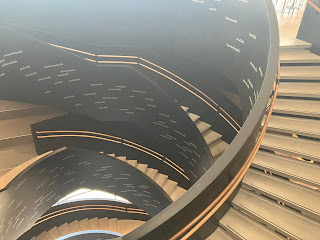February greetings! With a February fib to confess as well.
Reading a variety of texts is good for writers, isn't it? And I certainly do have lots of books to choose from home here.
However, when my local library emailed, inviting
me to sign up to ‘choose books in a different way’ I could
not resist. Despite all the To Be Read books home here, I slightly fibbed and signed up to ASKforaBook.
The introduction on the website promised ‘We’ll show you book covers instead of subjects. We’ll show you intriguing themes,’ so I was driven by a mix of writerly curiosity, suspicion of algorithms and pure personal nosiness. I was also informed that 'Real library people will use their expertise to email you recommendations that match your preferences’.
My next instruction was to click on the three book-covers from a panel of twelve that I’d be most likely to read, as a way of indicating my most-favoured genres. Then came the response: ‘Thank you for using Ask for a Book. We have received your request and your Book Picker will be in touch with the books they've chosen for you within 2 working days.’ Real books from county book stock and real people from the library!
I was even more pleased when ‘my Book Picker’ turned out to be a librarian whose name I knew: within two days, my ASK titles were ready for collection.
While at the library, I asked how the titles were chosen. How did the 'suggestion' system work? Once a ‘genre’ page has been selected, another dozen book-cover images op up on the screen, with information about each title. The 'library person', using those, and maybe other knowledge, chooses the best match, repeating the process for each genre.
I was concerned about the extra work that a flourishing ASK system could put on library staff and book stock in the future, as well as the range of books needed for each genre in particular, which could shape future library purchasing patterns. All unknown, as yet, so the experiment might prove interesting.
ASK was partly inspired by how libraries operated during the Covid era. Then, borrowers would email or phone, asking for their next loans, leaving the librarians (and volunteers?) to choose their actual titles. After three days, the borrowers (masked) collected their labelled books from the loan tables, returning other titles to be quarantined before
re-issue. Working like that, in an almost empty building, must have been a very lonely task. ASK, now, with its personal contact, can only be a more satisfying experience.
There must be options
and routes I have not met yet, and nor do I know how non-fiction fits within the scheme. Of course, any choice will depend on what is meant by that particular
genre; for example, the ‘Adventure’ genre I glimpsed seemed to
offer what I'd call ‘contemporary personal travel journeys’ rather than wider
geographical exploration I'd expected. No doubt, the library people will be able to refine or widen any search and customer feedback should certainly shape the system as it grows.
So
what titles did the system choose for me? One read already, one pleasing and one completely unknown.
The ‘crime/mystery’ category came up with THE NAME OF THE ROSE by UMBERTO ECO. A good choice, although one I’d already read. A trail of mediaeval murders in an oppressively scary monastery solved by a charismatic ex-crusader brother.
The ‘family & relationships’ category brought JOANNA TROLLOPE’S ‘MUM & DAD’. Probably a good ‘insomniac’ read to enjoy, with family problems I can understand without actually knowing much about a large house, Spanish vineyard or wide artistic life myself.
The ‘historical’ novel choice was definitely the most intriguing: ‘TO CALAIS IN ORDINARY TIME’ by JAMES MEEK, set in 1348, at the time of the Black Death. Three characters, from three classes of society, are travelling to the port of Calais.
We are used to historical novels, such as Hilary Mantel’s Cromwell trilogy, creating an ‘everyday, everybody’ style where the characters feel almost like us. Meek, however, through voice and vocabulary, creates characters who live unfamiliar lives in an era very much not our own. The young gentlewoman escaping marriage echoes Norman-French speech; the proctor on his way to a monastery in Avignon thinks and speak with Ecclesiastical Latin phrasing and vocabulary, and the words of the rough ploughman trying to join a company of archers reflect the Anglo-Saxon of his position as barely above serfdom.'To Calais, In Ordinary Time’ deserved its ‘widening reading’ label and at the moment, I am enjoying the challenge.
Will I love it? Will I finish it? I
don’t know, but the novel certainly fits ASK’s promise of ‘intriguing.’
These ASK titles could widen my reading and, as a library project, would certainly tick the box labelled Reader Development. Looking at the website, now the scheme has begun, the customer responses so far sound genuinely positive, and a little surprised; rather how I feel. ASK for a Book could be a Good Thing!
Hmm. I wonder if ASK reaches into junior or Young Adult fiction? Must investigate
Penny Dolan.















.jpg)




























